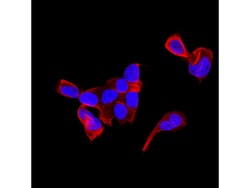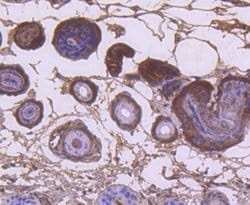Learn More
Invitrogen™ KRT9 Recombinant Rabbit Monoclonal Antibody (SD201-09)
Rabbit Recombinant Monoclonal Antibody
Supplier: Invitrogen™ MA532396
Description
Recombinant rabbit monoclonal antibodies are produced using in vitro expression systems. The expression systems are developed by cloning in the specific antibody DNA sequences from immunoreactive rabbits. Then, individual clones are screened to select the best candidates for production. The advantages of using recombinant rabbit monoclonal antibodies include: better specificity and sensitivity, lot-to-lot consistency, animal origin-free formulations, and broader immunoreactivity to diverse targets due to larger rabbit immune repertoire.
Cytokeratins are a subfamily of intermediate filament proteins and are characterized by a remarkable biochemical diversity, represented in human epithelial tissues by at least 20 different polypeptides. They range in molecular weight between 40 kDa and 68 kDa and isoelectric pH between 4.9 - 7.8. The individual human cytokeratins are numbered 1 to 20. The various epithelia in the human body usually express cytokeratins which are not only characteristic of the type of epithelium, but also related to the degree of maturation or differentiation within an epithelium.
Specifications
| KRT9 | |
| Recombinant Monoclonal | |
| 1 mg/mL | |
| TBS with 0.05% BSA, 40% Glycerol and 0.05% sodium azide; pH 7.4 | |
| P35527, Q6RHW0, Q8CIS9 | |
| KRT9 | |
| Recombinant protein wiehin Human Cytokeratin 9 aa 234-422. | |
| 100 μL | |
| Primary | |
| Human, Mouse, Rat | |
| Antibody | |
| IgG |
| Immunohistochemistry (Paraffin), Western Blot, Immunocytochemistry | |
| SD201-09 | |
| Unconjugated | |
| KRT9 | |
| CK-9; cytokeratin 9; cytokeratin-9; EPPK; K9; keratin 9; keratin 9 (epidermolytic palmoplantar keratoderma); keratin 9, type I; keratin complex 1, acidic, gene 9; keratin, type I cytoskeletal 9; Keratin-9; Krt1-9; Krt9; spermatid perinuclear ring manchette protein K9; type I cytoskeletal 9 | |
| Rabbit | |
| Protein A | |
| RUO | |
| 107656, 266717, 3857 | |
| Store at 4°C short term. For long term storage, store at -20°C, avoiding freeze/thaw cycles. | |
| Liquid |
Your input is important to us. Please complete this form to provide feedback related to the content on this product.

